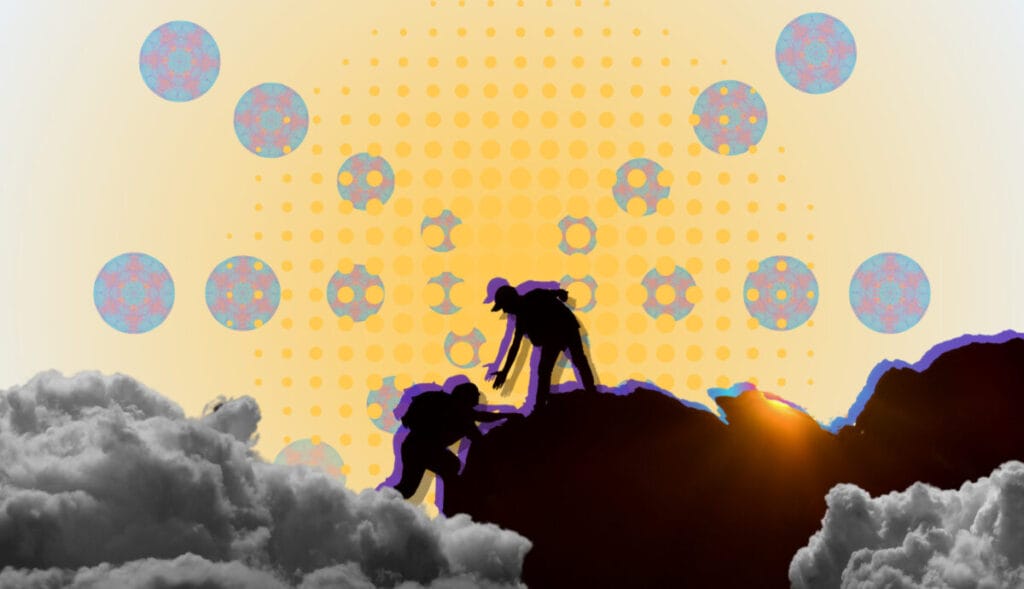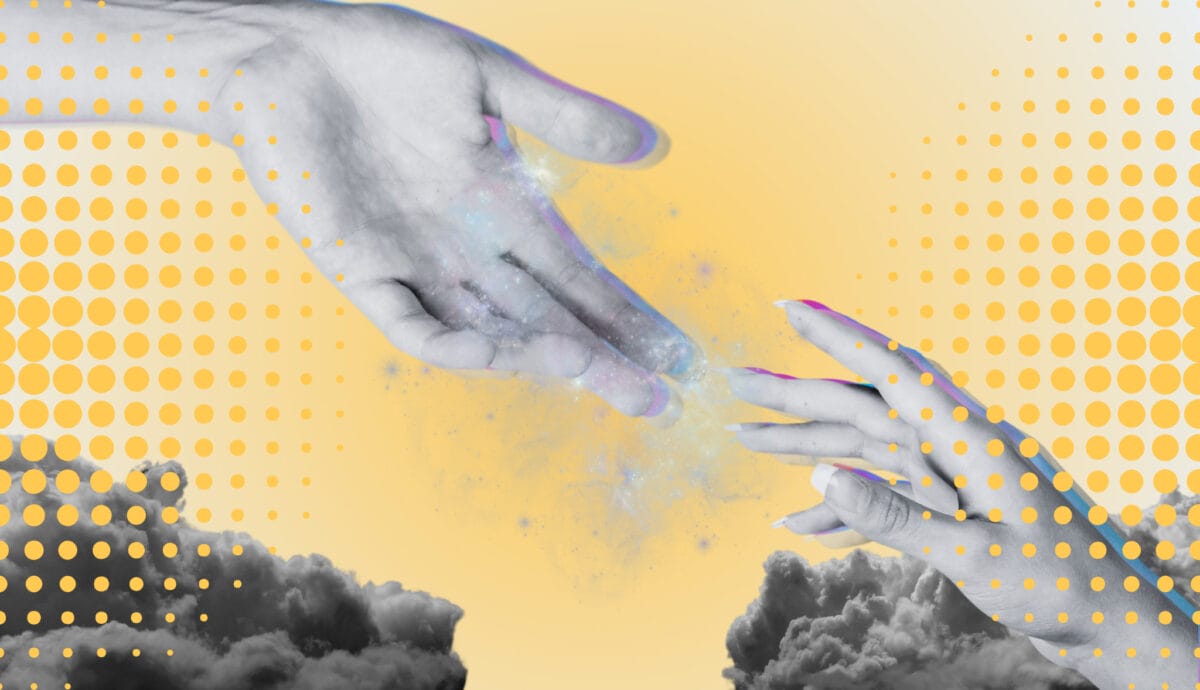Much like the psychedelic experience itself, the idea of ‘spaceholding’ or ‘holding space’ can strike some as a nebulous concept.
The term is largely synonymous with psychedelic facilitation or ceremony leading. When executed poorly, or not considered at all, the consequences can be severe for the recipient.

Why Holding Space Matters
When the psychedelic kicks in – whether it be psilocybin, ayahuasca, or 5-MeO-DMT – the individual may arrive at a fork in the road where the ego is invited to dissolve. How they navigate this juncture is key to the quality of the experience and managing their passage towards bliss is one of the key areas where a space holder can earn their salt.
With a safe container created for exploration and tools at hand, including mantras, breathing techniques, and attentive coaching, the journeyer is empowered to surrender gracefully through the depths of consciousness (and, possibly, dimensions). In that moment of ego death – should it occur during the trip – the body can experience long overdue relief from near perpetual fight or flight through a state of rest and digestion which promotes healing.
But in a chaotic setting, left unaided without guidance, travelers may find themselves engulfed in waves of fear and discomfort, veering into distress and confusion and finding elusive the state of simply being, without worries.

The Crucial Role of the Space Holder
The best space holders are beacons of guidance and support in the ethereal, mind-manifesting kaleidoscopic landscapes of a psychedelic journey. Their influence can determine the trip’s trajectory, and the best space holders remain discrete until they are called upon, possessing an intuitive sense of when greater direct presence is necessary.
In the uncharted territory of the psychedelic ’20s, as every man and his dog decides to serve toad venom and ayahuasca, the psychedelic community is increasingly emphasizing the need for well-trained facilitators. Initiatives and training programs like Navigating Psychedelics: For Clinicians and Wellness Practitioners aim to help equip those holding space with the skills to compassionately and adeptly facilitate psychedelic experiences for individuals and groups.
“Psychedelic therapy can bring about intense psychological, emotional, and physical experiences,” writes Michelle Anne Hobart, a spiritual emergence coach. It is thus crucial for space holders to be well-versed in trauma-informed practices to mitigate any issues that may arise, remaining calm, supportive and empathetic for their clients.

Creating Internal Space Through Set and Setting
In a sense, the phrase ‘space holder’ is metaphoric and refers to the creation of an internal sanctuary for the journeyer, through the adept management of their immediate external reality. Common pitfalls of flawed space holders can include a propensity for touch that may lead to intrusive physical contact, or encouraging excessively high doses. These missteps can all take the participant deeper into the experience than they are comfortable with, and risk energetic transference between the space holder and the participant.
Space holders must exhibit sensitivity and awareness, not only in setting the space optimally with appropriate music, smells, and vibes, but also in witnessing, guiding, and comforting individuals throughout their journey.
Otherwise, ceremonies intended to bring about transmutation and recalibration can become potentially dangerous and risk re-wounding participants who turned up to heal. “The ones who are in the role of holding vigil must be as attuned as the survivors of trauma and spiritual emergency themselves have had to be,” adds Hobart.

Maintaining Personal Integrity
The participant has effectively given the space holder permission to witness them in a highly suggestible, hyperplastic and defenseless state. “You’re really putting yourself in someone else’s hands in a very, very vulnerable way, even if you’re an experienced psychonaut,” says Dr. Ido Cohen, a psychedelic facilitator and the founder of the Integration Circle.
The space holder may wish to remain as invisible as possible until they are called upon. It can be tricky to know when greater presence is required, and when to simply allow the profound journey of self-discovery and transformation to happen.
An often-overlooked element of space holding is the ability to be completely present with a participant in their process without judgment or having a desire to give advice, according to Victoria Wueschner, president of F.I.V.E. (5-MeO-DMT Information & Vital Education). Deep in the throes of a visionary psychedelic journey, emotions and words shared may inadvertently relate to the space holder, but it is imperative they do not take it personally and instead remain in a state of compassionate detachment.
“When facilitators step into the role of being a space holder, they commit to giving their full attention and presence to the participant by actively listening with compassion, free of personal ego or motive,” says Wueschner.

‘Let the Unfolding Experience Be the Guide’
If somebody feels unsafe, rushed, or judged, it is more likely that negative thoughts and unresolved memories can arise in an overwhelming fashion. The space holder ideally lifts the weight from the participant’s shoulders, and when the path is clear, a protective bubble is created to block distractions and allow greater space for them to dive deep into their psyches and transform their inner worlds. The space holder is their unobtrusive cheerleader.
The key principles of the Zendo Project, which provides harm reduction education and psychedelic peer support services, are trusting, letting go, being open, breathing and surrendering. The organization advises space holders to be calm, meditative presences of acceptance, care, and compassion.
“Promote feelings of trust and security,” they say on their website. “Let the person’s unfolding experience be the guide. Don’t try to get ahead of the process. Explore distressing issues as they emerge, but simply being with the person can provide support.”

Space Holding Begins Before the Space Opens (and Continues After It Closes)
Another aspect of space holding that can be neglected is the process of screening individuals to ascertain whether a particular psychedelic experience is suited for their needs, and then helping people prepare. If a space holder does not, at a minimum, offer to conduct a call before the journey day and provide some preparation exercises – such as intention-setting, journalling or meditation – then that should ring alarm bells.
Space holding doesn’t end when the effect of the psychedelic wears off. A key component of the healing process is the integration – a period which can consist of check-in calls, talk therapy, and the provision of a personalized schedule of activities such as spending time in nature and avoiding certain foods.
But, ultimately, everything is rooted in a trusting bond between the space holder and the patient or client, says Dr. David Rabin, a psychiatrist and neuroscientist who co-founded Apollo Neuroscience.
“Holding space always begins with a safe setting, rooted in trust, that helps to create the fertile ground for the seed of healing to grow. Without the trust and safety of the therapeutic alliance, the healing process can be completely shut down.”


